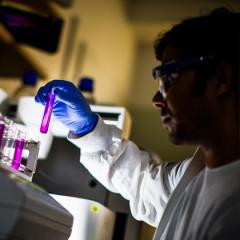The distance between a researcher at the lab bench and a patient in a hospital chair is vast, with one immersed in test tubes and protocols, and the other navigating uncertainty, hope, and side effects.
But thanks to a team at the Australian Institute for Bioengineering and Nanotechnology (AIBN), the gap is beginning to close.
Under the guidance of Associate Professor Joy Wolfram from AIBN and the School of Chemical Engineering, a new consumer engagement model is bringing people with lived experience into research from the very beginning.
“Involving people with lived experience makes research more relevant, and improves how it’s funded, communicated, and applied,” Wolfram said.
“Their insights help shape our ideas, guide experiments, and ensure the science stays focused on what matters most which is the people it’s meant to help.”
To support this approach, her team developed a three-tier engagement model that recognises there’s no one-size-fits-all approach to consumer involvement. People can contribute in different ways depending on their time, interests and experience.
“The beauty of this model is that it meets people where they’re at,” Wolfram said.
“Some just want to share their story, others want to collaborate, and some may want to co-lead research projects. All of these voices are important.”
The first tier invites consumers to share their lived experience. The second enables them to help design, review or communicate research, and the third supports trained consumers to act as partners in leading projects.
The model took shape during a workshop in October 2024, where researchers, clinicians, cancer survivors and patient advocates came together to explore new ways of working.
“Breast Cancer Network Australia were leading a similar initiative and we came on board as partners - collectively wanting to build and strengthen the evidence base supporting the value of genuine consumer-researcher partnerships,” Associate Professor Wolfram said.
“We were thrilled to contribute to the organisation of both events, which offered guidance for researchers to build meaningful partnerships with those affected by disease, not only during clinical trials, but throughout the research journey.”
“We want to shift the focus earlier, to the stages where lived experience is often missing, but critically important,” said AIBN PhD student and framework co-developer Raluca Ghebosu.
“Most engagement models focus on clinical trials. But this is about embedding soft skills, human connection, and real-world insight from the start.”
Ghebosu said the experience changed how she thinks about her work.
Join The Network
Stay on top of our industry news and developments, events and opportunities, by joining The Network
“It reminded me that we’re not just studying cells. We’re trying to help people.”
Survey results from workshops show the framework is already have an impact, with a 43% increase in researchers’ understanding of how to work with consumers, and a 32% boost in their confidence to do so.
For consumers, it created meaningful connection and a chance to shape the future of health research.
“It was an eye-opener for so many of us,” said Merran Williams, a 71-year-old retired nurse and cancer survivor.
“Being able to sit face-to-face with researchers and clinicians made it feel less intimidating and more collaborative.
“We all want research to move forward, and this gave us the tools to help make that happen.”
Funders also played an active role in the workshop, recognising the potential for consumer-researcher partnerships to shape more relevant and impactful science.
“AIBN’s approach reflects a growing expectation across the sector,” said National Breast Cancer Foundation CEO Dr Cleola Anderiesz, who spoke at the event.
“Meaningful consumer engagement is no longer a nice-to-have, it’s central to delivering research that truly makes a difference.”
This work was supported by Health Translation Queensland, the National Breast Cancer Foundation, The University of Queensland, Queensland University of Technology, the Translational Research Institute, the Medical Research Future Fund, and PA Research Foundation.
The research was published in Jounral of Translational Medicine on 22 September 2025 and co-authored by Raluca Ghebosu, Leonie Young, Benedette Watson, Merran Williams, Ashley Dedmon, Jo Maxwell, Professor Erik W. Thompson, Associate Professor Fernando Souza-Fonseca-Guimaraes, and Associate Professor Joy Wolfram.
Want to learn more about this story or how you can partner with AIBN on ground-breaking research?
Contact us via email: communications@aibn.uq.edu.au
or phone: +61 414 984 324


